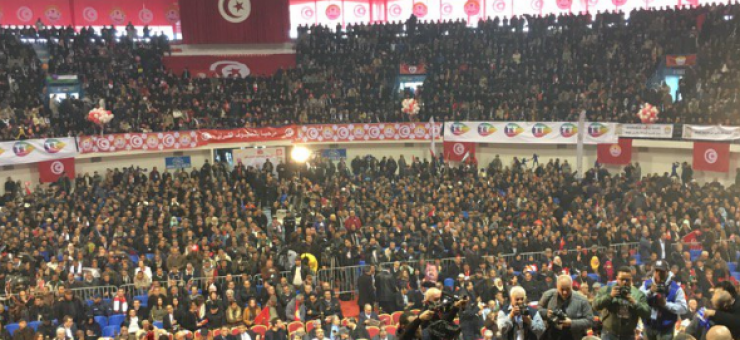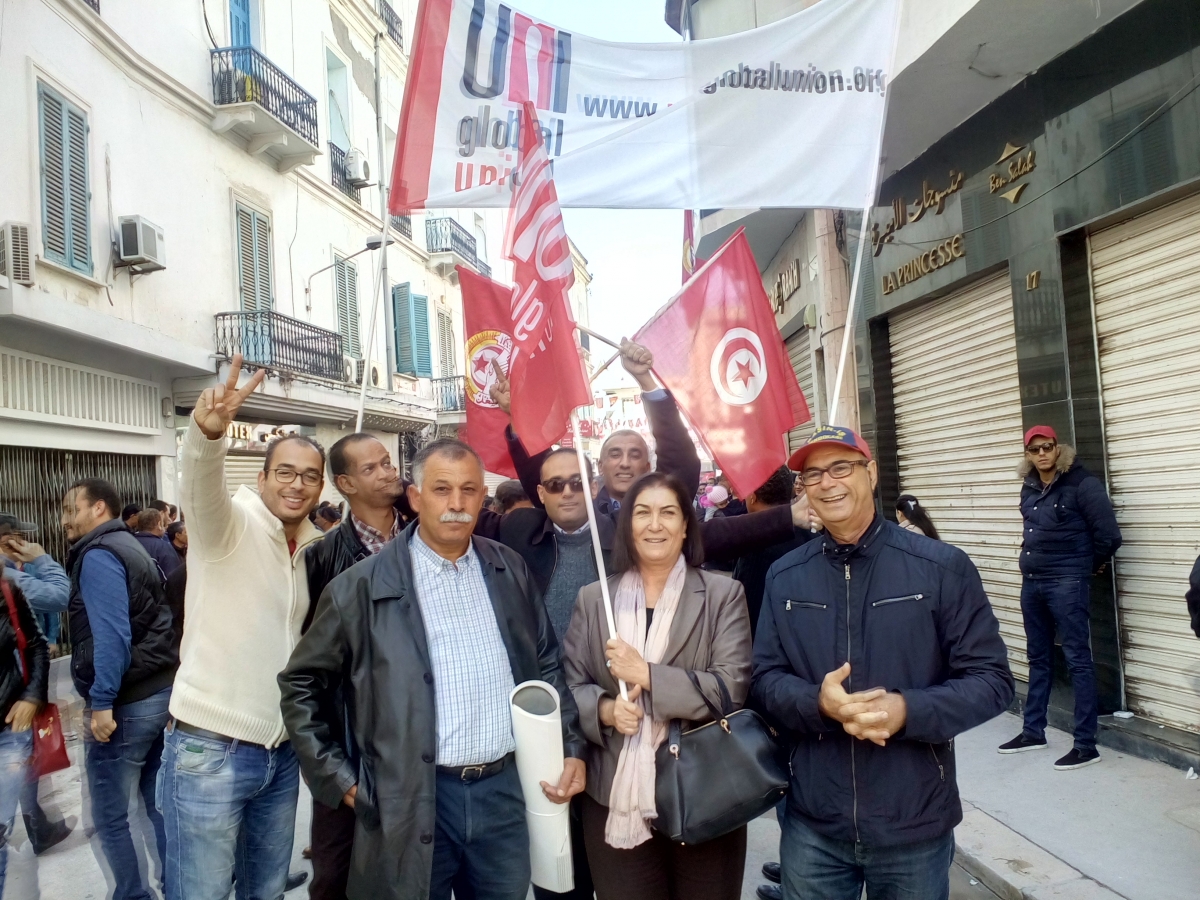Trade Unions at the Heart of Tunisian Democracy

At the 23rd Congress of the Union Generale des Travailleurs Tunisiens (UGTT), UNI Global Union General Secretary Philip Jennings applauded the courageous efforts of Tunisian workers over the last 70 years.
Nobel Peace Prize
Jennings paid tribute to the UGTT for its role in winning independence for the nation and its economic social and democratic development. Each generation of UGTT leaders has been tested and Jennings commended the longstanding and courageous contribution made by the UGTT to the international labour movement.
Chief among the outstanding achievements of the UGTT was their role in saving the country from a civil war through social dialogue and multi-lateral cooperation in 2013. For his role in the National Dialogue Quartet, the secretary general of UGTT Houcine Abassi, together with members of the Tunisian Confederation of Industry, Trade and Handicrafts, The Tunisian Human Rights league and the Tunisian Order of Lawyers, won the Nobel Peace Prize in 2015 “for its decisive contribution to the building of a pluralistic democracy in Tunisia in the wake of the Jasmine Revolution of 2011”.
“The Nobel Peace Prize is not something we coveted,” said Houcine Abassi. “It’s a great honour to receive it, but the prize belongs to the ordinary people of Tunisia – to the UGTT, to the martyrs and to the youth of Tunisia.”
“It brings the responsibility of persevering to manage our political economic, social and cultural affairs and serves as an example to other countries going through difficult transitional periods.”
“I was present in Oslo in 2015 – it was one of the most memorable days of my life and a big day in the history of international trade unionism,” said Philip Jennings.
“The Nobel Prize had a huge international significance. Trade unions all over the world took heart, in a world of closing democratic spaces, in the fact that the prize supports the union role in the fight for democracy and freedom. The award was a testament to trade unionism as one of the pillars of democracy.”
Savage Capitalism
In a wide-ranging speech, Jennings spoke passionately against the savage capitalism “of the 1%, by the 1% and for the 1%.”
“You changed the destiny of your country, and our task together is to change the economic destiny of the world,” said Jennings, issuing a challenge to the full-house in Tunis. “Inequality is a threat to peace and democracy. In the fight against inequality, strong trade unions and bargaining rights are fundamental.”
Private Sector growth
In Tunisia, the private sector accounts for 60% of all jobs and 62 % of national revenue. During his time in Tunisia, Jennings met with the president of UTICA Ouided Bouchamaoui, the national employers federation that shared the Nobel Prize with the UGTT.
“We must grow our union presence in the private sector and in a digitalised future world of work. Our objective is to increase union density in these growing sectors and achieve our longstanding goal with the UGTT - a collective agreement across the entire contact centre industry in Tunisia.” He also proposed that UGTT and UNI Global Union should engage in a Future World of Work initiative.
Women and youth representation
Jennings also used the occasion to urge the UGTT to include women and young people in their power structures, “We have a huge opportunity to make sure that women and young people are represented in our trade unions. Tunisian women are strong and are ready to fight injustice. We must ensure that they are present in the decision-making processes in our unions.”
Naima Hammami was elected as the first ever woman to the executive board of the UGTT, and will be in charge of the international relations of the UGTT. This sends a strong message of support for young Tunisian women in the trade union movement.

“Women in Tunisia do not want to play secondary roles – they want equality. We salute the women who took to the streets around the world to send a strong message against the xenophobia, hatred and division cultivated by Donald Trump.”
Return to Tunisia
After a series of dramatic and well publicized terrorist attacks in Tunisia which drew international condemnation, the Tunisian economy has seen a marked plunge with the tourism sector particularly suffering. Tourism accounts for 8 % of the Tunisian GDP and provides thousands of jobs. The downturn in tourism, with a decrease of 35% in 2016, helped push the dinar currency to historic lows against the dollar and Euro last July.
Jennings called on the international investment community, that quit the country in their hundreds, to return to Tunisia, saying “the Tunisian economy and people need the return of investment and tourism in the country.”
Houcine Abassi said, “We are a nation famed for civilization, co-existence and tolerance between religions and groups. We are united and our movement is engaged in the struggle for peace and against terror.”

